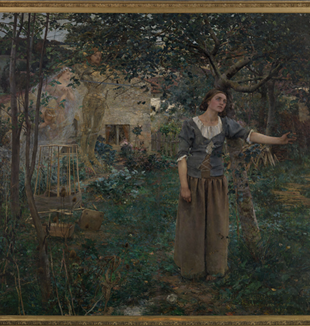
Mark Twain’s Joan of Arc
“The story of Joan of Arc burned in Twain’s heart and mysteriously, 600 years after she lived, it burns in mine.”A few months back I stumbled on Mark Twain’s book, Joan of Arc. I decided to read it since I couldn’t find the book I was looking for in the first place. An unusual thing happened to me at the very end — I wept. Even before I was very deep into it I had already begun telling everyone — my friends, my parents, my wife, my coworkers — how good it was. Recently, I had the joyful opportunity to tell her story again at our CL family vacation. For that occasion, I was happily accompanied by a friend in reading it again and preparing what to say. When we asked ourselves what was so moving, we recognized three key reasons and why her story was worth sharing.
First, it is a story of faith — simple, earnest, surpassing expectation and exceeding imagination. Twain had a giant imagination, but if he had set out to imagine such an event as Joan of Arc’s life, he would have rendered a terrible story. It is only compelling because the story of her life comes to us on unparalleled historical authority: the trial of condemnation was recorded by no less than 3 notaries and 25 years after her death, the Vatican deposed more than 100 witnesses to recount their experience of the events touching her short life. The thing I find most striking about the story preserved in those records was Joan’s simplicity, obedience, and steadfast faith in front of obstacles that were utterly insurmountable as seen through the eyes of conventional wisdom. I, for one, saw the facts of my life in a different light after learning the facts of Joan’s life and her witness of faith.
Second, it is a story, still playing out today, of how we engage our reason. Then, as now, people freely believe what they want to. Her story has been appropriated for many causes over the years, from women’s suffrage to radical-traditionalist Catholicism to transgender causes. In her time, some regarded her with mortal hatred and jealousy, others with self-defeating ambivalence, and others with love, like the infamously unruly general of the Hundred Years’ War, La Hire. Against all odds, but out of affection for her, he finally arrived at his own genuine prayer: “Fair Sir God, I pray you to do by La Hire as he would do by you if you were La Hire and he were God.”
Third, it is a story of being moved by a witness of faith. Twain wasn’t particularly religious, perhaps one could say he was even anti-Catholic, and probably anti-French. Nevertheless, he spent 10 years meticulously researching the story of Joan of Arc, and two years finding the perfect voice to write it. Why was he so devoted to her story? He dismissed his previous works, though they were far more famous, as not worth reading. There’s no doubt that Joan of Arc was his favorite work, and in his mind, his best. Finally, the story of Joan of Arc is simply fascinating and true. It was a beautiful gift to share it with my friends during the recent summer vacation. The story of Joan of Arc burned in Twain’s heart and mysteriously, 600 years after she lived, it burns in mine.
Roland, Evansville, IN